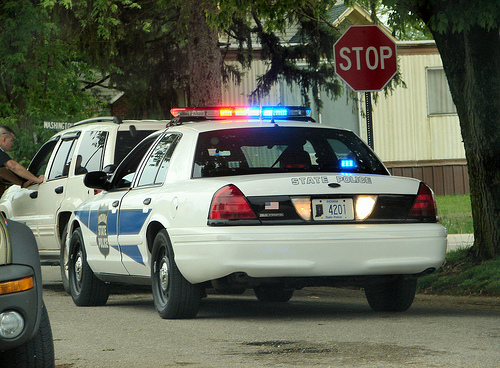When does a traffic stop violate the Pennsylvania Constitution?
 There a lot of illegal drug, gun and firearm (VUFA) cases in Pennsylvania and beyond that started with a traffic stop. Police have stopped most of us at least once if we’ve been driving a car in the Commonwealth or any state for a significant period of time. Traffic stops occur for a variety of reasons but usually a driver has violated some section of the motor vehicle code (Title 75) such as speeding, running a stop sign, a red light or there’s something wrong with the vehicle (window tint, car registration, tail light).
There a lot of illegal drug, gun and firearm (VUFA) cases in Pennsylvania and beyond that started with a traffic stop. Police have stopped most of us at least once if we’ve been driving a car in the Commonwealth or any state for a significant period of time. Traffic stops occur for a variety of reasons but usually a driver has violated some section of the motor vehicle code (Title 75) such as speeding, running a stop sign, a red light or there’s something wrong with the vehicle (window tint, car registration, tail light).
The violation provides the law enforcement officer with probable cause to stop the vehicle and this is constitutionally permissible. After the car stop, the police officer is permitted to investigate the violation and question the driver about it. If, however, the officer continues to question after the purpose of the initial traffic stop is achieved, he needs reasonable suspicion to support the continued seizure and investigation.
If the officer continues to question, it is presumed that the driver isn’t free to leave. It’s important to keep in mind, however, that as long as the officer’s attention and focus remains on the initial traffic stop, he is not only permitted to question the driver and investigate the violation but order the driver out of the vehicle in the course of issuing the citation for the initial traffic violation.
Remember, that reasonable suspicion is based not only on the officer’s observations but his knowledge and length of experience in his position. Pennsylvania Courts, however, will still evaluate this constitutional requirement on an objective standard – what are the facts available to the officer at the moment of the interaction that would cause an officer to reasonably believe that further police action was needed to investigate a possible crime (Totality of the Circumstances.) There needs to be reasonable suspicion and it can’t be a hunch or guess or some type of baseless suspicion.
Pennsylvania courts have found that reasonable suspicion doesn’t exist simply because a driver appears nervous during questioning or that the driver’s “story” seemed inconsistent with regards to the length of time he was driving the car or that the driver’s story didn’t “add up” with the passenger’s version. Reasonable suspicion, however, does exist where the officer smells or hears something that, based on his experience and training, could be some type of contraband (drugs, controlled substance, or guns). This second round of questioning once the initial traffic stop questioning is completed (officer gives back driver’s license and issues citation) requires something more than just the officer “looking for something” to support it.
Frequently the officers will ask to search the vehicle during this second round of questioning without any reasonable suspicion to do so. The driver’s consent, however, allows the office to bypass the need for a search warrant as all searches in Pennsylvania are presumed unreasonable without a warrant. While the Pennsylvania case of Commonwealth v. Garry has challenged the concept of exigent circumstances and Pennsylvania’s protection against warrantless searches, this case is distinguishable from many Pennsylvania drug and gun cases.
Even if the officer orders the driver out of the car, there still must be an independent basis for the continued questioning. Without reasonable suspicion, any and all evidence obtained, even if the driver consents following questioning, could be held inadmissible under the Exclusionary Rule. Reasonable suspicion is a lower form of probable cause and so police don’t need as many “articulable facts” as probable cause. Probable cause, as you may recall, is the standard that federal and state courts will use to evaluate the search and/or arrest of a criminal suspect.
These concepts are critical especially in cases in involving drugs, guns or any firearms in Pennsylvania. They form the foundation to a Motion to Suppress Evidence based on a violation of a person’s constitutional rights under Article 1, Section 8 of Pennsylvania Constitution and the 4th and 14th Amendment to the United States Constitution.
For more information on a criminal defense strategy I encourage you to subscribe to my newsletter and visit my free download section.
